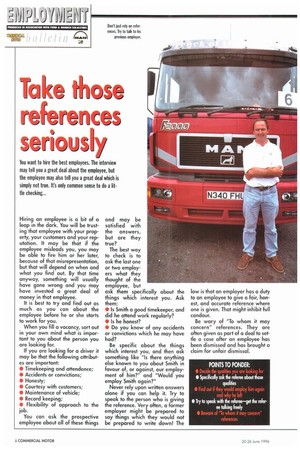7:ike !those re 'forams serious
Page 56

If you've noticed an error in this article please click here to report it so we can fix it.
Hiring an employee is a bit of a leap in the dark. You will be trusting that employee with your property, your customers and your reputation. It may be that if the employee misleads you, you may be able to fire him or her later, because of that misrepresentation, but that will depend on when and what you find out. By that time anyway, something will usually have gone wrong and you may have invested a great deal of money in that employee.
It is best to try and find out as much as you can about the employee before he or she starts to work for you.
When you fill a vacancy, sort out in your own mind what is important to you about the person you are looking for.
If you are looking for a driver it may be that the following attributes are important: • Timekeeping and attendance; • Accidents or convictions; • Honesty; • Courtesy with customers; • Maintenance of vehicle; • Record keeping; • Flexibility of approach to the job.
You can ask the prospective employee about all of these things and may be satisfied with the answers, but are they true?
The best way to check is to ask the last one or two employers what they thought of the employee, but ask them specifically about the things which interest you. Ask them: • Is Smith a good timekeeper, and did he attend work regularly?
• Is he honest?
• Do you know of any accidents or convictions which he may have had?
Be specific about the things which interest you, and then ask something like "Is there anything else known to you about Smith in favour of, or against, our employment of him?" and "Would you employ Smith again?"
Never rely upon written answers alone if you can help it. Try to speak to the person who is giving the reference. Very often, a former employer might be prepared to say things which they would not be prepared to write down! The law is that an employer has a duty to an employee to give a fair, honest, and accurate reference where one is given. That might inhibit full candour.
Be wary of "To whom it may concern" references. They are often given as part of a deal to settle a case after an employee has been dismissed and has brought a claim for unfair dismissal.
















































































































